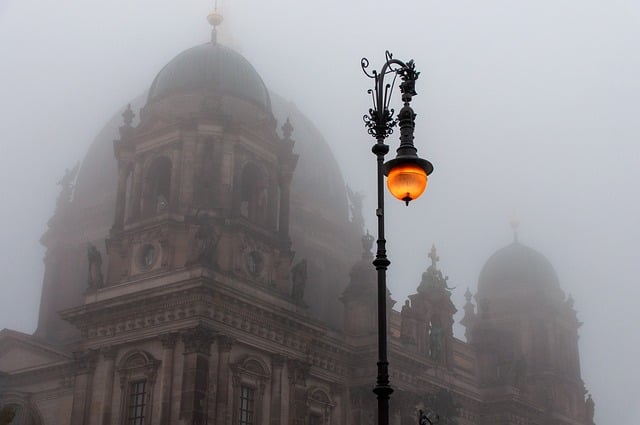In the Catholic Church, a “Dom” is a title used for certain members of religious orders, particularly those in monastic communities. It is often used as a form of address for monks or nuns who have taken vows of poverty, chastity, and obedience.
Table of Contents
Definition of ‘Dom’ in the Catholic Church
Have you ever heard the term ‘Dom’ being used in the Catholic Church and wondered what it means? Well, you’re not alone! Many people are unfamiliar with this term and its significance within the Church. In this article, we will explore the definition of ‘Dom’ in the Catholic Church and shed some light on its meaning.
In the Catholic Church, the term ‘Dom’ is often used as a title of respect for certain members of the clergy. Specifically, it is used to address monks and priests who are part of a religious order, such as the Benedictines or the Dominicans. The title ‘Dom’ is derived from the Latin word “dominus,” which means “lord” or “master.” It is a way of showing reverence and honor to those who have dedicated their lives to serving God through their religious vocation.
When addressing a monk or priest with the title ‘Dom,’ it is a sign of respect for their commitment to a life of prayer, contemplation, and service to the Church. It acknowledges their role as spiritual leaders and guides within their religious community. The title ‘Dom’ is not used for all members of the clergy but is reserved for those who have taken vows of poverty, chastity, and obedience as part of their religious calling.
In addition to monks and priests, the title ‘Dom’ can also be used for certain lay members of religious orders who hold positions of authority or leadership within their community. These individuals may have taken on specific roles or responsibilities that require them to be addressed with the title ‘Dom’ as a mark of their dedication and service to the Church.
Overall, the term ‘Dom’ in the Catholic Church is a way of recognizing and honoring those who have chosen a life of devotion to God and the Church. It is a symbol of their commitment to living out their faith in a profound and meaningful way, and it serves as a reminder of the importance of spiritual leadership and guidance within the religious community.
So, the next time you hear someone referred to as ‘Dom’ in the Catholic Church, remember that it is a title of respect and honor for those who have dedicated their lives to serving God and His people. It is a reminder of the rich tradition and history of religious life within the Church and the important role that monks, priests, and lay members of religious orders play in spreading the message of Christ to the world.
In conclusion, the term ‘Dom’ in the Catholic Church is a symbol of reverence and respect for those who have chosen a life of religious devotion and service. It is a title that acknowledges the commitment and sacrifice of monks, priests, and lay members of religious orders who have dedicated themselves to living out their faith in a profound and meaningful way. So, the next time you encounter someone addressed as ‘Dom,’ remember the significance of this title and the important role that these individuals play in the life of the Church.
Historical Origins of ‘Dom’ in Catholicism
Have you ever heard the term ‘Dom’ used in the Catholic Church and wondered what it means? In the world of Catholicism, ‘Dom’ is a title that is often used before the name of a monk or a priest. But where did this title come from, and what is its significance in the Church?
To understand the origins of ‘Dom’ in the Catholic Church, we have to go back in history to the early days of monasticism. Monasticism, or the practice of living a life of prayer and contemplation in a community, has been a central part of the Catholic tradition for centuries. Monks and nuns who dedicated their lives to this way of life were often given titles of respect, such as ‘Dom’ or ‘Dame’, to signify their commitment to God and their role within the Church.
The title ‘Dom’ itself is derived from the Latin word “Dominus”, which means “Lord” or “Master”. In the context of the Catholic Church, ‘Dom’ is used as a sign of respect for those who have taken vows of poverty, chastity, and obedience in service to God. It is a way of acknowledging the authority and spiritual leadership of these individuals within the Church community.
In addition to monks and nuns, ‘Dom’ is also used before the names of priests in some Catholic traditions. This practice dates back to the medieval period when priests were often associated with monastic communities and shared in their spiritual practices. By using the title ‘Dom’, priests were able to align themselves with the values and traditions of monasticism, even if they were not part of a formal religious order.
Today, the use of ‘Dom’ in the Catholic Church is less common than it once was, but it still holds a special significance for those who choose to embrace it. For monks and nuns, the title ‘Dom’ serves as a reminder of their commitment to a life of prayer, simplicity, and service to others. For priests, it can be a way of honoring the spiritual heritage of the Church and connecting with the traditions of the past.
While the title ‘Dom’ may seem like a small detail in the grand scheme of Catholicism, it carries with it a rich history and a deep sense of tradition. By using this title, individuals in the Church are able to connect with the spiritual practices of those who have come before them and to honor the values of humility, obedience, and devotion that have guided the faithful for centuries.
In conclusion, ‘Dom’ in the Catholic Church is more than just a title – it is a symbol of dedication, reverence, and tradition. Whether used before the name of a monk, a nun, or a priest, ‘Dom’ serves as a reminder of the values and principles that have shaped the Catholic faith for generations. So the next time you hear someone referred to as ‘Dom’, take a moment to appreciate the history and significance behind this simple yet powerful word.
Role and Responsibilities of a ‘Dom’ in the Church

Have you ever heard the term ‘Dom’ being used in the Catholic Church and wondered what it means? In the Church, a ‘Dom’ is a title given to a person who holds a position of authority and responsibility within the religious community. The role of a ‘Dom’ is an important one, as they are tasked with overseeing various aspects of the Church’s operations and ensuring that everything runs smoothly.
One of the primary responsibilities of a ‘Dom’ is to lead the congregation in worship and prayer. This involves presiding over Mass, delivering sermons, and providing spiritual guidance to the members of the Church. A ‘Dom’ is seen as a spiritual leader within the community, and their words and actions are meant to inspire and uplift those around them.
In addition to their spiritual duties, a ‘Dom’ also plays a key role in the administration of the Church. They are responsible for managing the day-to-day operations of the Church, overseeing staff members, and making decisions about the direction of the community. A ‘Dom’ must be a skilled organizer and communicator, as they are often called upon to mediate conflicts and make difficult decisions on behalf of the Church.
Another important aspect of the role of a ‘Dom’ is pastoral care. This involves providing support and guidance to members of the congregation who are going through difficult times, such as illness, grief, or personal struggles. A ‘Dom’ is there to offer a listening ear, a comforting presence, and words of wisdom to those in need.
Overall, the role of a ‘Dom’ in the Catholic Church is a multifaceted one that requires a combination of spiritual, administrative, and pastoral skills. A ‘Dom’ must be a strong leader, a compassionate caregiver, and a faithful servant of God. They are called to serve the Church and its members with humility and dedication, always striving to uphold the values and teachings of the Catholic faith.
In conclusion, the role of a ‘Dom’ in the Catholic Church is a vital one that encompasses a wide range of responsibilities. From leading worship services to providing pastoral care, a ‘Dom’ plays a crucial role in the life of the Church and its members. If you ever have the opportunity to meet a ‘Dom’ in your local parish, take the time to thank them for their service and dedication to the community. They are truly the heart and soul of the Church, and we are blessed to have them guiding us on our spiritual journey.
Differences Between ‘Dom’ and Other Titles in the Catholic Church
Have you ever heard the term ‘Dom’ used in the Catholic Church and wondered what it means? In the Catholic Church, ‘Dom’ is a title that is used for certain members of religious orders, particularly those who are part of the Benedictine tradition. It is a title of respect and honor, similar to ‘Father’ or ‘Brother’, but with its own unique significance.
One key difference between ‘Dom’ and other titles in the Catholic Church is that ‘Dom’ is specifically used for members of the Benedictine order. Benedictines are a religious order founded by St. Benedict of Nursia in the 6th century, known for their commitment to prayer, work, and community life. The title ‘Dom’ is a way of recognizing the special role that Benedictines play within the Church and their dedication to the Benedictine way of life.
Another difference between ‘Dom’ and other titles in the Catholic Church is that ‘Dom’ is often used in conjunction with a monk’s religious name. For example, a Benedictine monk might be known as ‘Dom John’ or ‘Dom Michael’, with ‘Dom’ serving as a prefix to their given name. This helps to distinguish Benedictines from other religious orders and emphasizes their unique identity within the Church.
In addition to Benedictines, the title ‘Dom’ is also used for certain members of other religious orders, such as the Carthusians and the Cistercians. These orders have their own distinct traditions and practices, but they share a common commitment to prayer, contemplation, and community life. The title ‘Dom’ is a way of honoring their dedication to their particular charism and recognizing their important role within the Church.
One of the key aspects of the Benedictine tradition is the emphasis on stability, obedience, and humility. Benedictines take vows of stability, promising to remain in a particular monastery for the rest of their lives, obedience, committing to follow the rule of St. Benedict and the guidance of their abbot, and humility, recognizing their own limitations and dependence on God. The title ‘Dom’ reflects these values and serves as a reminder of the Benedictine commitment to a life of prayer, work, and community.
Overall, the title ‘Dom’ is a unique and meaningful designation within the Catholic Church, reserved for members of certain religious orders who have dedicated their lives to prayer, work, and community life. It is a way of honoring their commitment to their particular charism and recognizing their important role within the Church. So, the next time you hear someone referred to as ‘Dom’, you’ll know that they are a member of a Benedictine or other religious order, living out their faith in a special and distinctive way.
Controversies Surrounding the Title of ‘Dom’ in the Catholic Church
Have you ever heard the term ‘Dom’ being used in the Catholic Church and wondered what it means? Well, you’re not alone. The title of ‘Dom’ has sparked some controversy within the Church, with some people questioning its origins and significance. In this article, we’ll explore the meaning of ‘Dom’ in the Catholic Church and delve into the controversies surrounding its use.
First and foremost, it’s important to understand that ‘Dom’ is a title of respect and honor that is used to address certain members of the clergy in the Catholic Church. The title is derived from the Latin word “Dominus,” which means “Lord” or “Master.” In the context of the Church, ‘Dom’ is typically used to address monks, abbots, and other high-ranking members of religious orders.
One of the main controversies surrounding the title of ‘Dom’ is its perceived elitism and hierarchical nature. Some critics argue that the use of ‘Dom’ reinforces a sense of superiority and privilege among certain members of the clergy, creating a divide between them and the rest of the Church community. This has led to calls for greater transparency and accountability within the Church hierarchy, with some advocating for the abolition of titles like ‘Dom’ altogether.
On the other hand, supporters of the title argue that it is an important symbol of tradition and continuity within the Church. They believe that titles like ‘Dom’ serve to honor the dedication and commitment of those who have devoted their lives to serving God and the Church. Additionally, they argue that titles like ‘Dom’ help to maintain a sense of order and structure within the Church, ensuring that roles and responsibilities are clearly defined.
Despite the controversy surrounding the title of ‘Dom,’ it continues to be used in many religious orders and communities around the world. For those who hold the title, it is a mark of respect and recognition for their service and devotion to the Church. However, it is important to remember that titles like ‘Dom’ should not be used to elevate individuals above others or to create a sense of hierarchy within the Church.
In conclusion, the title of ‘Dom’ in the Catholic Church is a complex and multifaceted issue that has sparked debate and controversy among members of the clergy and the wider Church community. While some see it as a symbol of tradition and honor, others view it as a divisive and elitist practice that reinforces hierarchies and inequalities within the Church. Ultimately, the use of titles like ‘Dom’ should be approached with caution and sensitivity, ensuring that they are used in a way that promotes unity, humility, and service within the Church.
Conclusion
In the Catholic Church, ‘Dom’ is a title used for members of religious orders, particularly those in monastic communities. It is derived from the Latin word “dominus,” meaning lord or master, and is used as a form of address for monks and nuns.


